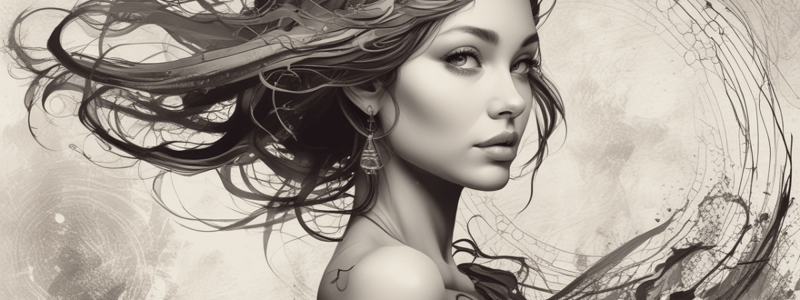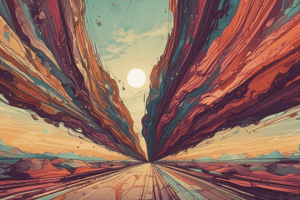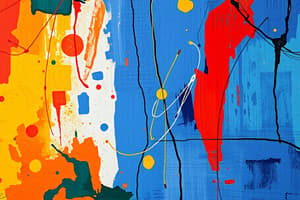Podcast
Questions and Answers
What is the primary role of texture in visual art?
What is the primary role of texture in visual art?
- To add depth and engage the senses of the viewer (correct)
- To create a sense of movement
- To create a sense of unity
- To create a sense of balance
Which technique involves applying thick layers of paint onto the canvas?
Which technique involves applying thick layers of paint onto the canvas?
- Impasto Technique (correct)
- Carving
- Mixed Media
- Dry Brushing
What can be used to create interesting textures in painting?
What can be used to create interesting textures in painting?
- Only paint
- Only water
- Only brush strokes
- Unconventional materials like sand, fabric, or paper (correct)
What is the purpose of dry brushing in painting?
What is the purpose of dry brushing in painting?
What opportunities does sculpture offer for artists to experiment with texture?
What opportunities does sculpture offer for artists to experiment with texture?
What is the result of carving in sculpture?
What is the result of carving in sculpture?
What is the purpose of modeling in sculpture?
What is the purpose of modeling in sculpture?
What is the outcome of experimenting with different tools and techniques in modeling?
What is the outcome of experimenting with different tools and techniques in modeling?
What is the effect of combining smooth and rough surfaces in a sculpture?
What is the effect of combining smooth and rough surfaces in a sculpture?
What is the purpose of using macro photography?
What is the purpose of using macro photography?
How can you enhance textures in post-processing?
How can you enhance textures in post-processing?
What is a way to create textures in embroidery?
What is a way to create textures in embroidery?
What is the purpose of using appliqué in textile art?
What is the purpose of using appliqué in textile art?
What is a way to add texture in quilting?
What is a way to add texture in quilting?
Why is experimenting with texture important in art?
Why is experimenting with texture important in art?
What is the result of incorporating texture in art?
What is the result of incorporating texture in art?
Flashcards are hidden until you start studying
Study Notes
Texture in Visual Art
- Texture plays a crucial role in enhancing visual art, providing depth, and engaging the viewer's senses.
- Artists use texture to create various effects, add interest, and convey emotions or ideas in their works.
Texture in Painting
- Impasto technique involves applying thick layers of paint to create a textured surface, adding depth and dimension to the artwork.
- Mixed media can create interesting textures by incorporating materials like sand, fabric, or paper onto the canvas.
- Dry brushing involves using a dry brush with little paint to create rough and textured strokes, suitable for adding texture to specific areas or highlighting details.
Texture in Sculpture
- Carving involves using tools to create textures such as lines, grooves, or patterns on the surface of the sculpture.
- Modeling involves building up layers of clay or other materials to create a textured surface, experimenting with different tools and techniques.
- Incorporating mixed materials, such as metal, wood, or fabric, can add contrasting textures and visual interest to a sculpture.
Texture in Photography
- Macro photography captures fine details in a subject, conveying texture through composition and lighting.
- Choosing backgrounds or surfaces with interesting textures can complement and emphasize the main subject.
- Post-processing editing software can enhance and accentuate textures found in photographs, adjusting contrast, clarity, and sharpness.
Texture in Textile Art
- Embroidery involves experimenting with different stitches to create textures on fabric, mixing stitches like French knots, satin stitches, or couching.
- Appliqué combines different fabric textures by layering them onto the main fabric, creating depth and visual interest.
- Quilting incorporates various fabrics with different textures, playing with fabric placements to add visual and tactile variety.
Practical Application of Texture
- Experimenting and exploring different textures is crucial to finding what works best for an artistic vision.
- Incorporating texture can elevate art, engage the viewer's senses, and create visually captivating works of art.
Studying That Suits You
Use AI to generate personalized quizzes and flashcards to suit your learning preferences.




